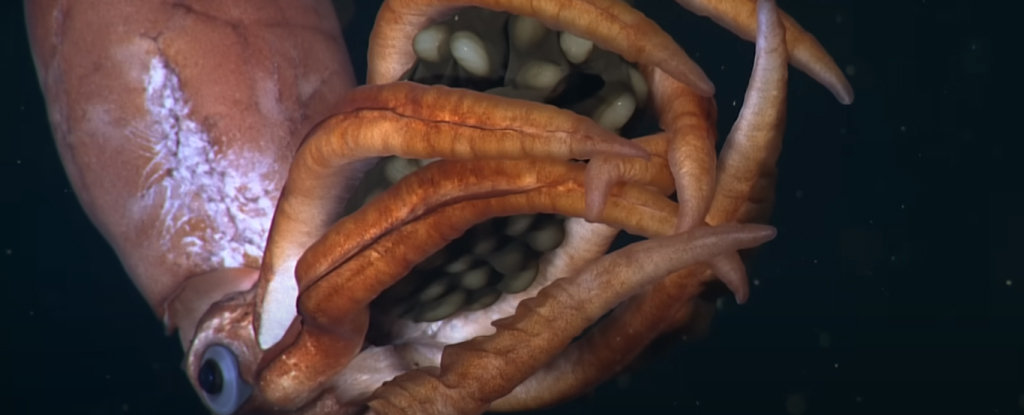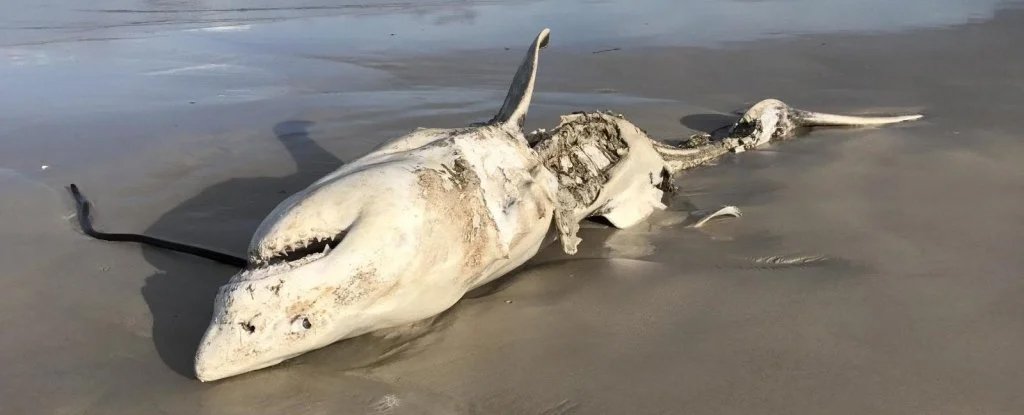In the cold, dark waters of the Gulf of California, a strange squid was discovered keeping vigil over her incubating young.
At depths far below the reach of sunlight, a remotely operated vehicle caught sight of a species of cephalopod few humans – if any – would have laid eyes upon. Tightly clasped in her arms was a clutch of eggs.
This would be unusual enough on its own; few squids brood their eggs this way. But these eggs were also unusually enormous, twice as large as the eggs of other brooding squids.
“The deep sea is the largest living space on Earth and there is a lot left to be discovered,” says marine scientist Steven Haddock of the Monterey Bay Aquarium Research Institute (MBARI).
“Our unexpected encounter with a squid brooding giant eggs caught the attention of everyone in the ship’s control room. This remarkable sighting underscores the diversity of ways that animals adapt to the unique challenges of living in the deep.”
While the reproductive strategies of a number of squid species remain a mystery, those we know something about typically have a ‘drop-and-run’ approach to parenthood, where eggs are left in giant, eerie, gelatinous balls of mucus, or deposited directly onto the seafloor.
But we know even less about the reproduction of squids in the deeper parts of the ocean, where our exploration has barely penetrated.
With remotely operated vehicles, we’re starting to learn more. Researchers controlling these science vessels from a ship on the surface have now seen a number of deep-sea squids carrying hundreds of eggs, linked together in a sheet that allows the mother to watch over them as the precious babies grow and hatch into paralarvae that can swim free and fend for themselves.
The recently announced observation of this particular squid and her babies occurred on an expedition to the Gulf of California back in 2015. On one of its dives, ROV Doc Ricketts encountered the beastie hanging around at a depth of 2,566 meters (8,419 feet), right in the middle of the bathypelagic zone.
Although MBARI ROVs have caught sight of a total of 17 brooding squids to date, most of them have sheets of smaller eggs, carrying up to an estimated 3,000 at one time. This mama squid was carrying just a few eggs – perhaps 30 or 40, the researchers estimated. And each egg was large, up to 11.7 millimeters (0.46 inches) in diameter.
She probably belongs to the Gonatidae, or armhook squid, family. And while she is the first brooding squid known to us with such large eggs, other squid species that lay large eggs give us a clue about the benefits of larger versus more numerous.
A greater number of offspring, of course, increases the chance some will survive to adulthood and make baby squid of their very own. But the conditions in the bathypelagic are more stable and predictable than the waters above, where food availability or predators could be a greater concern.
This means that larger eggs that hatch larger, more robust paralarvae could be a better reproductive strategy. This is what scientists have seen in a few other (non-brooding) deep-sea species.
frameborder=”0″ allow=”accelerometer; autoplay; clipboard-write; encrypted-media; gyroscope; picture-in-picture; web-share” referrerpolicy=”strict-origin-when-cross-origin” allowfullscreen>
And carrying the eggs around is probably an excellent strategy to keep them safe while the babies develop. The researchers estimate that it takes between one and four years for the embryos to develop fully, which is a long time to be vulnerable. This newly discovered squid takes her offspring’s survival seriously – so much that she will sacrifice her own for it.
“Brooding takes a lot out of a mother squid. She won’t eat while carrying her eggs and ultimately dies after her eggs hatch. But her sacrifice improves the chances that her offspring will survive. It’s just one of the many remarkable adaptations that may help cephalopods to survive in the deep sea,” explains marine biologist Henk-Jan Hoving, formerly of MBARI, now at the GEOMAR-Helmholtz Centre for Ocean Research Kiel in Germany.
“Squid play an important role in the ocean – they’re fierce predators and a vital food source for lots of animals, even humans – but we still have a lot to learn about the squid that live in the deep sea.”
The discovery has been documented in the journal Ecology.





